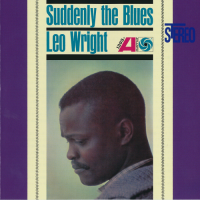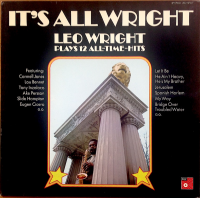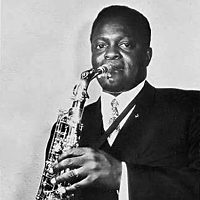Home » Jazz Musicians » Leo Wright
Leo Wright
In 1968 MPS Records assembled four alto saxophonists who, together, represented the spectrum of 1960s post-bop alto sax. Alto Summit featured Lee Konitz with his angular, abstract lines that stretched the boundaries of jazz, Phil Woods, feet firmly planted in the bop tradition, Norwood “Pony” Poindexter, the often overlooked reedman who never lost bop’s blues roots, and Leo Wright, in whose playing can be heard the full spectrum: bop, hard bop, Texas blues, and third stream, along with a healthy dose of Latin and African flavors.
Leo Nash Wright was born on December 14, 1933 in Wichita Falls, Texas. He took up the saxophone in the early 1940s under the tutelage of his father Mel, who taught him, “Don’t forget what came before.” He was influenced early on by blues greats Louis Jordan and fellow Texan Eddie “Cleanhead” Vinson. As Wright told one reporter, “People in the South know the blues.” His first alto idol, however, was Johnny Hodges whom Wright called the “father of the alto saxophone.”
It was also inevitable that a young altoist in the fifties would fall under the spell of Charlie Parker. “Whatever Bird was doing, in all his music,” Wright said of his predecessor, “he retained the idea of the blues.” Wright could never have imagined that just a few years out of college he would play Bird’s former role as the foil to Dizzy Gillespie.
Drafted into the army in 1956, Wright began what would eventually be a long relationship with Europe. While stationed in Stuttgart, Germany, he played in a variety of bands that included Eddie Harris, Cedar Walton, Don Ellis, and Houston Person—young musicians, like Wright, ready to break onto the American jazz scene when they returned.
After a brief stint with Charles Mingus, which included an appearance at the 1959 Newport Festival, Wright joined company with Dizzy Gillespie, in whose band he would play for the next three years. Whatever he might have learned in college, Wright attended finishing school during his three years with Diz. “Dizzy is a giant,” Wright said at the time. “And when you’re working with the giants, you’ve got to improve. . . . You’ve got to learn discipline, get down to business. I’m still in school.”
It was at the University of Dizzy that Wright’s playing gained its full range. The expanding world musical consciousness of his leader and their globe spanning travels added to Wright’s bop and blues vocabulary the musical idioms of Latin America, the Near East, and Africa.
Read moreTags
Tadd Dameron: Fontainebleau & Magic Touch Revisited

by Maurizio Zerbo
Le linee guida di Fontainebleau e Magic Touch, i due capolavori di Tadd Dameron qui riuniti in un solo CD, furono teorizzate dal pianista di Cleveland sulle pagine della rivista Record Changer, in cui descrisse come la sua adesione all'estetica del bebop fosse mediata dalla classica scrittura swing. Le forme multitematiche ABA e i trasporti di chorus di “The Scene Is Clean," nonché i quattro movimenti di “Fontainebleau" che non contengono una sola nota improvvisata, forniscono prove tangibili ...
Continue ReadingTadd Dameron: Fontainebleau & Magic Touch Revisited

by Chris May
There is much that is tragic about Tadd Dameron's story. The composer, arranger and pianist fell prey to the heroin epidemic that gripped New York's jazz world in the 1940s and 1950s. He did jail time for his addiction in 1959-60. He died at the woefully young age of 48 years in 1965. But there is nothing tragic about Dameron's legacy as a composer-arranger, the field in which he made his most important contribution to jazz. His work was unfailingly ...
Continue ReadingLeo Wright: Suddenly the Blues (1962)

Source:
JazzWax by Marc Myers
When he wasn't playing and recording in the 1960s with Dizzy Gillespie, Tadd Dameron, Milt Jackson and others, alto saxophonist and flutist Leo Wright recorded a handful of albums as a leader. One of the best of these was Suddenly the Bluues. Recorded for Atlantic in April 1962, Wright's quartet included Leo Wright (as,fl), Kenny Burrell (g), Ron Carter (b) and Rudy Collins (d). The album was his second studio recording as a leader, the first being Blues Shout for ...
read more


























